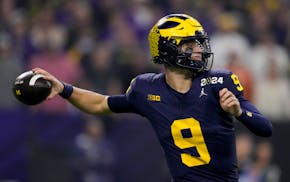Minnesotans always have loved Tony Dungy.
Why wouldn't we?
He was an admirable quarterback for the University of Minnesota. He resurrected his coaching career as Denny Green's defensive coordinator, displaying his brilliance with a series of defenses that made even average players look like stars, while proving that a soft-spoken, humane coach can lead.
Dungy used the Vikings as the stepladder with which he broke through the NFL's glass ceiling, becoming the head coach of the Tampa Bay Buccaneers at a time when the dearth of black NFL head coaches was still a disheartening topic.
He won more than any previous Bucs coach had ever won. When Dungy was fired because of a lack of playoff success, the Indianapolis Colts quickly hired him.
He became the first black NFL head coach to win a Super Bowl. Upon retirement, he became a respected TV analyst. He also became the unofficial conscience of pro football.
This week, Dungy was quoted by the Tampa Tribune saying he would not have drafted Missouri standout Michael Sam, because of the potential distractions Sam might bring as he tries to become the NFL's first openly gay player.
"Not because I don't believe Michael Sam should have a chance to play, but I wouldn't want to deal with all of it,'' Dungy was quoted as saying. "It's not going to be totally smooth … Things will happen.''
One question for the man we like to think of as the ultimate football role model:
How would young Tony Dungy have felt if the University of Minnesota had adopted that mind-set toward black quarterbacks?
Dungy was an outstanding high school quarterback in Jackson, Mich. Minnesota native Tom Moore, then a Gophers assistant coach, relentlessly pursued Dungy, judging him an ideal blend of athletic ability and intelligence.
This was 1973, less than 10 years after the signing of the Civil Rights Act, and five years after the assassination of Martin Luther King Jr. For many Division I programs, and certainly NFL teams, black quarterbacks were ridiculously stereotyped as good athletes who couldn't necessarily run a passing offense. Not until 1988 did a black quarterback win a Super Bowl.
Those stereotypes didn't matter at Minnesota. Sandy Stephens became both the first black man to play quarterback for the Gophers, and the only quarterback ever to take them to the Rose Bowl. At Minnesota, thanks to coach Murray Warmath, Dungy didn't have to break a color barrier.
Certainly, Moore didn't see color as an obstacle. Dungy immediately became the Gophers' starter, and the two great football thinkers formed a partnership that would benefit each for decades.
What if Warmath, or Moore, had worried about the reaction of racists — then a real distraction — to a black quarterback?
Not only would Dungy have not attended Minnesota, he wouldn't have had reason to seek out Moore to be his offensive coordinator in Indianapolis.
There, Moore mind-melded with another smart quarterback, Peyton Manning. As he did at Minnesota, Moore designed an offense that took advantage of his quarterback's intelligence and study habits. Manning and Moore helped Dungy become the first black coach to win a Super Bowl.
Dungy began making his way in the football world because Warmath and Moore, two strong-willed men from a generation that grew up in the era of segregation, didn't care about stereotypes, or whisper campaigns.
Tuesday, Dungy released a statement explaining his position. It read, in part: "I do not believe Michael's sexual orientation will be a distraction to his teammates or his organization. I do, however, believe that the media attention that comes with it will be a distraction. Unfortunately we are all seeing this play out now, and I feel badly that my remarks played a role in the distraction.''
That kind of backward, cowardly thinking would have kept Branch Rickey from signing Jackie Robinson, or Dungy from taking up the cause of a dog killer named Michael Vick.
Supporting a trailblazer requires courage. Warmath and the University of Minnesota had it. Dungy seems to have misplaced his.
Jim Souhan can be heard weekdays at noon and Sundays from 10 to noon on 1500 ESPN. @SouhanStrib • jsouhan@startribune.com

Souhan: Wolves fans made Game 1 special. Now bring on Game 2.

Souhan: Should Vikings even consider McCarthy in NFL draft?

Souhan: NAW erases Suns' lead, Game 1 advantage with big performance

Souhan: This is KAT's chance to prove Flip Saunders was right


